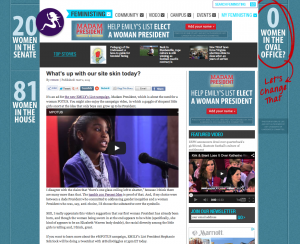Bloggers aren’t ‘trained writers’ (thank God!)
by Henry CopelandTuesday, October 22nd, 2013
Martha Stewart, famous for her insider trading and trend-setting for the bourgeoisie, today took a whack at bloggers.
Who are these bloggers? They’re not trained editors and writers at Vogue magazine. I mean, there are bloggers writing recipes that aren’t tested, that aren’t necessarily very good or are copies of everything that really good editors have created and done. Bloggers create kind of a ‘popularity‘. But they are not the experts and we have to understand that.
Some bloggers are annoyed by Martha’s sneering.
I think Martha’s gotten at least one important think right. She’s right that many bloggers are not ‘trained writers.’ But she’s wrong that many bloggers are not experts. On the contrary, it’s the journalists who are not experts… they’re magpies, hopping from topic to topic as directed by their editors. Meanwhile, many bloggers are experts, writing daily about the same topic, a topic they’re passionate about, a topic they actuallyspecialize in for their day jobs. Which makes bloggers’ insights and questions far more important than those pushed out on deadline by the average dilettante journalist, trained or not.

